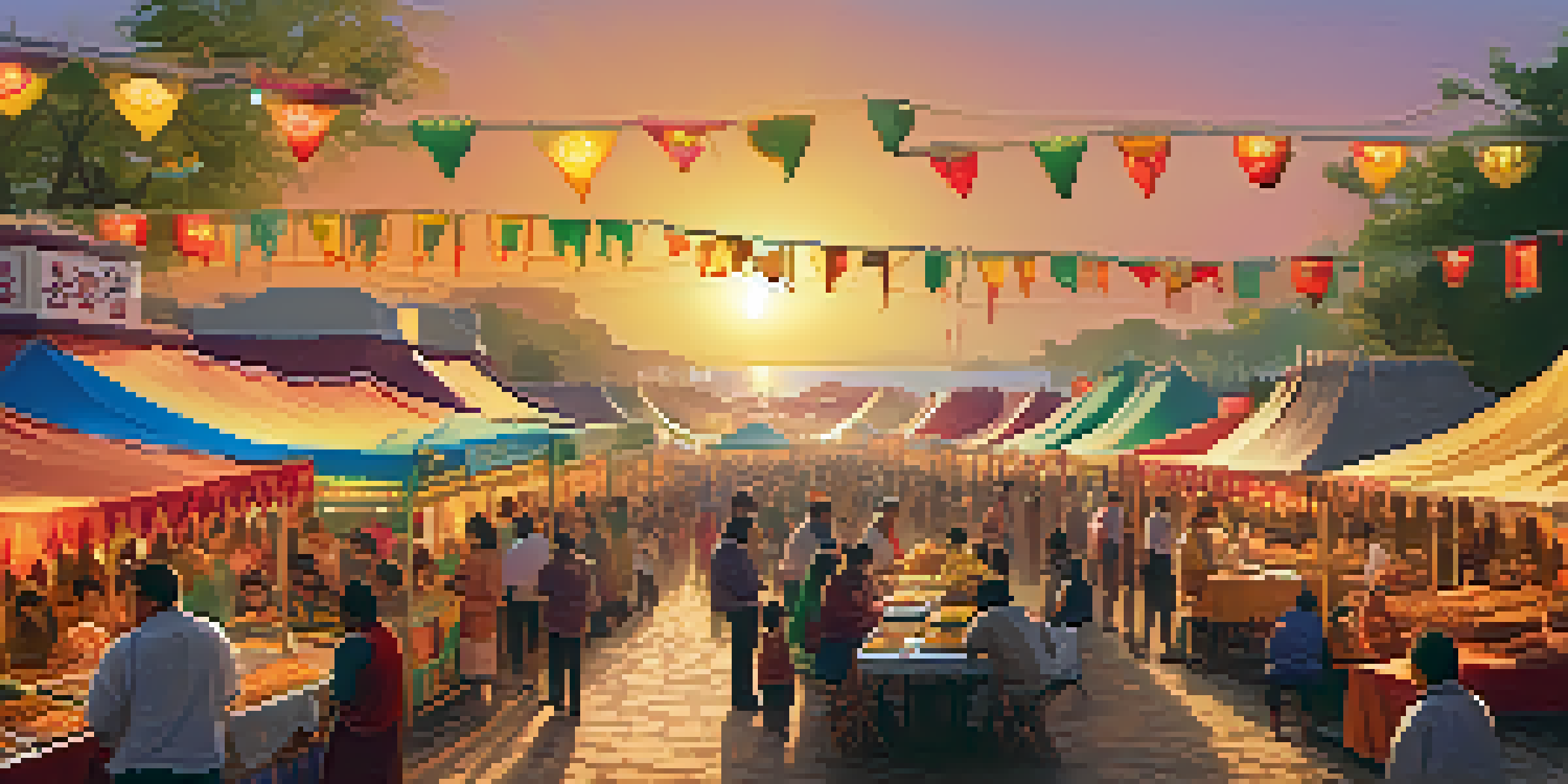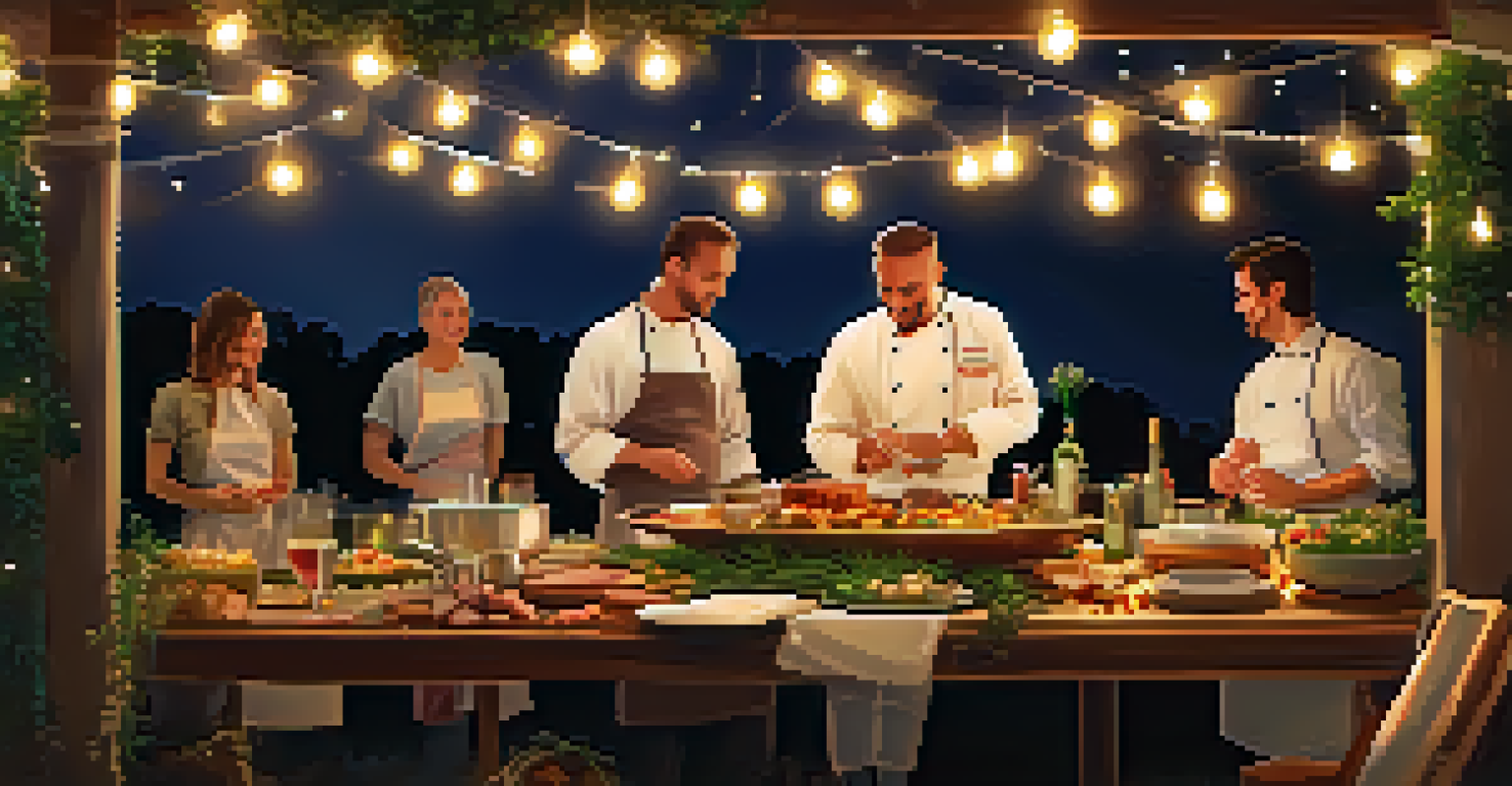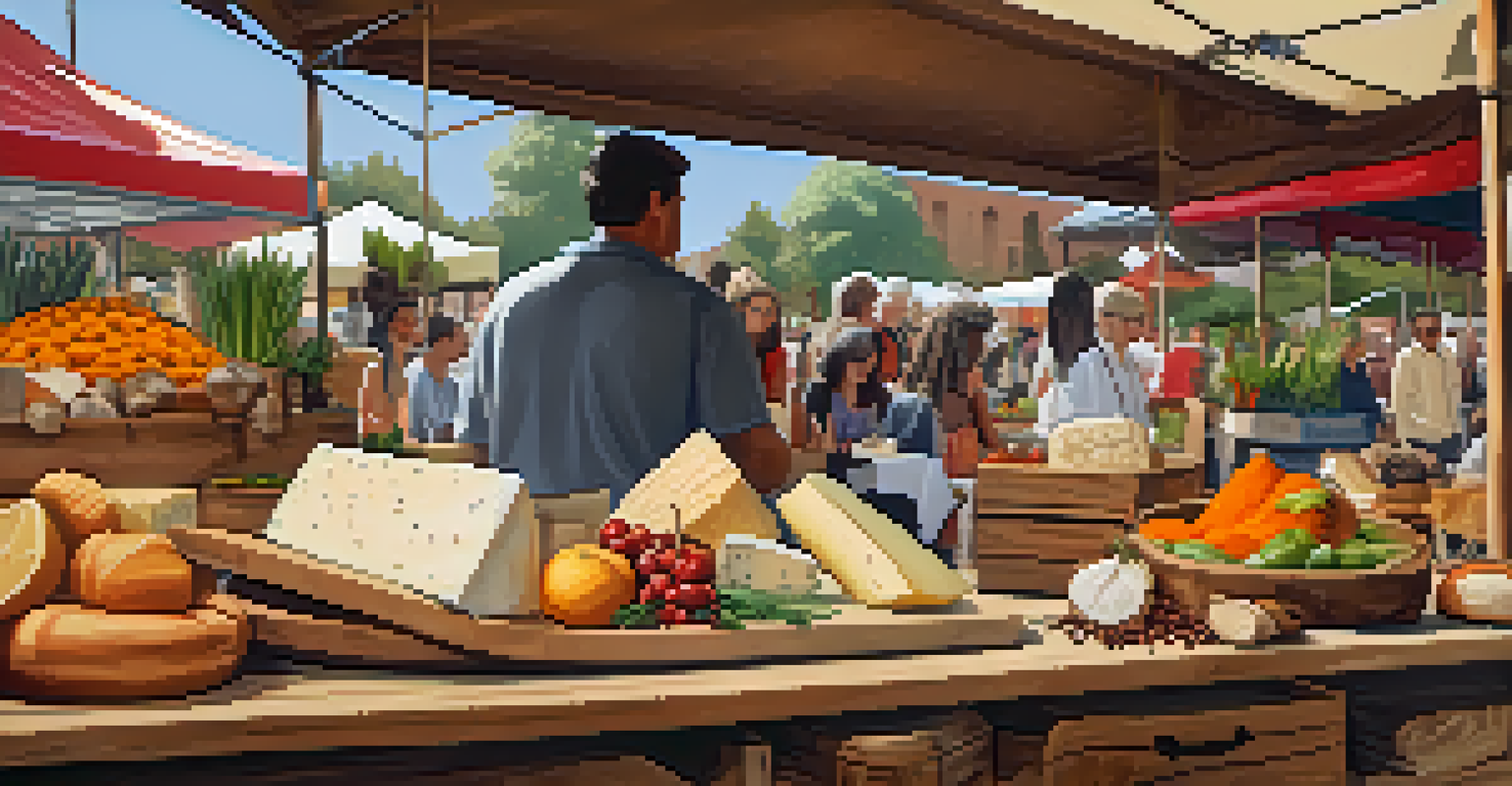How Local Cuisine Festivals Promote Regional Tourism

Local Cuisine Festivals: A Gateway to Regional Identity
Local cuisine festivals are more than just food events; they serve as vibrant reflections of a region's culture and identity. These festivals highlight traditional dishes, cooking methods, and local ingredients, allowing visitors to experience the essence of a place in a unique way. When people think of traveling, they often seek authentic experiences, and food is a significant part of that exploration.
Food is our common ground, a universal experience.
By showcasing regional specialties, these festivals create a sense of pride among locals and attract tourists eager to immerse themselves in the community's flavors. For instance, a festival featuring a city's famous barbecue can draw in food lovers from miles away, eager to savor those unique tastes. This connection between food and place is a powerful draw for travelers.
Moreover, local cuisine festivals often include cultural performances, art displays, and workshops, enriching the overall experience. This multi-faceted approach not only entertains but also educates visitors about the region's heritage, deepening their appreciation for the local culture.
Economic Impact: Boosting Local Businesses
One of the most tangible benefits of local cuisine festivals is the economic boost they provide to the region. By attracting visitors, these events increase foot traffic in local restaurants, markets, and shops, leading to higher sales and potential job creation. For small businesses, this influx can be a game-changer, providing them with exposure they might not have otherwise received.

For example, a small farmer selling organic produce at a festival may gain new customers who will continue to support their business long after the event is over. Additionally, local artisans and craftspeople often find a platform at these festivals to showcase their products, fostering a sense of community and shared success. This symbiotic relationship between visitors and local vendors is key to sustainable tourism.
Festivals Reflect Local Identity
Local cuisine festivals showcase regional dishes and traditions, creating authentic cultural experiences for visitors.
The increase in tourism also encourages local governments to invest in infrastructure, such as better roads and public facilities, further enhancing the visitor experience. Thus, the economic ripple effect of these festivals can be significant, making them a win-win for both tourists and the local economy.
Cultural Exchange: Bridging Communities Through Food
Local cuisine festivals are a wonderful opportunity for cultural exchange, where different communities come together to share their culinary heritage. Visitors from various backgrounds can taste diverse dishes, learn about unique cooking techniques, and even participate in cooking demonstrations. This sharing of food fosters understanding and appreciation among different cultures.
The discovery of a new dish does more for the happiness of mankind than the discovery of a star.
As people gather to enjoy local delicacies, they also share stories and experiences, building connections that transcend geographical boundaries. Imagine a food festival where a chef from one community collaborates with a chef from another, creating a fusion dish that symbolizes unity. Such collaborations not only celebrate diversity but also create lasting memories for attendees.
Furthermore, these festivals often include interactive elements, such as cooking classes or food tastings, which engage visitors actively. This hands-on approach ensures that attendees leave with not only a full belly but also a richer understanding of the region's culinary landscape and the people behind it.
Sustainability: Promoting Local Ingredients and Practices
Sustainability is becoming increasingly important in tourism, and local cuisine festivals play a pivotal role in promoting eco-friendly practices. By focusing on local ingredients and seasonal produce, these festivals encourage sustainable farming and fishing practices, reducing the carbon footprint associated with food transportation. This emphasis on local sourcing helps preserve the environment while supporting regional farmers and producers.
For instance, a festival that highlights farm-to-table dining not only showcases delicious food but also educates attendees about the importance of supporting local agriculture. Visitors often leave with a greater awareness of where their food comes from and how their choices affect the environment. This shift towards sustainability can lead to long-term changes in consumer behavior.
Economic Boost for Local Businesses
These festivals significantly increase foot traffic and sales for local vendors, fostering community growth and sustainability.
Moreover, many festivals are beginning to implement green practices, such as using biodegradable utensils and promoting recycling. By setting a positive example, they inspire both locals and visitors to adopt more sustainable habits, ensuring that the region remains vibrant and beautiful for future generations.
Creating Memorable Experiences Through Culinary Adventures
Local cuisine festivals are designed to create memorable experiences that visitors will cherish long after the event is over. From tasting unique dishes to participating in cooking competitions, these events offer a variety of engaging activities that cater to all ages. The joy of discovering new flavors or learning a traditional recipe can leave a lasting impression on attendees.
For example, a festival might feature a 'chef's table' experience where guests can enjoy an exclusive meal prepared by renowned local chefs. Such experiences not only highlight the culinary talent within the community but also provide a sense of exclusivity that makes visitors feel special. This personal touch can lead to positive word-of-mouth marketing.
As attendees share their experiences with friends and family, they become ambassadors for the region, encouraging others to visit and partake in future festivals. This organic promotion is invaluable, as it builds a community of enthusiasts who eagerly anticipate the next culinary adventure.
Social Media: Amplifying the Reach of Food Festivals
In today's digital age, social media plays a crucial role in promoting local cuisine festivals. Platforms like Instagram and Facebook allow festival organizers to showcase mouthwatering dishes, vibrant cultural performances, and excited attendees in real time. This visual storytelling helps create buzz and anticipation, drawing in a larger crowd.
For example, a well-timed post featuring a tantalizing dish can go viral, reaching thousands of potential visitors within a matter of hours. When attendees share their experiences online, they provide authentic endorsements that can significantly influence the decisions of their followers. This organic reach is a powerful tool for tourism promotion.
Culinary Tourism is on the Rise
As travelers seek immersive food experiences, local cuisine festivals are becoming key attractions in regional tourism strategies.
Additionally, festivals can leverage hashtags and geotags to make it easier for people to find related content. By encouraging attendees to share their experiences, organizers can create a sense of community online, further enhancing the festival's reputation and drawing in more visitors year after year.
The Future of Local Cuisine Festivals in Tourism
As travel trends evolve, local cuisine festivals are likely to become even more integral to regional tourism strategies. With travelers increasingly seeking authentic experiences, festivals that celebrate local flavors and traditions will continue to thrive. Communities that invest in their culinary heritage are poised to attract more visitors who value unique, immersive experiences.
Moreover, the rise of culinary tourism—a niche focused on food experiences—means that regions with vibrant food scenes will stand out in a crowded travel market. Festivals can serve as a focal point for these efforts, providing a platform for local chefs and producers to showcase their talents. This focus on culinary excellence can enhance a region's reputation as a must-visit destination.

With sustainability and community engagement becoming key considerations for travelers, local cuisine festivals that prioritize these values will resonate with modern tourists. By embracing innovation and adapting to changing trends, these festivals can continue to flourish and play a vital role in promoting regional tourism.